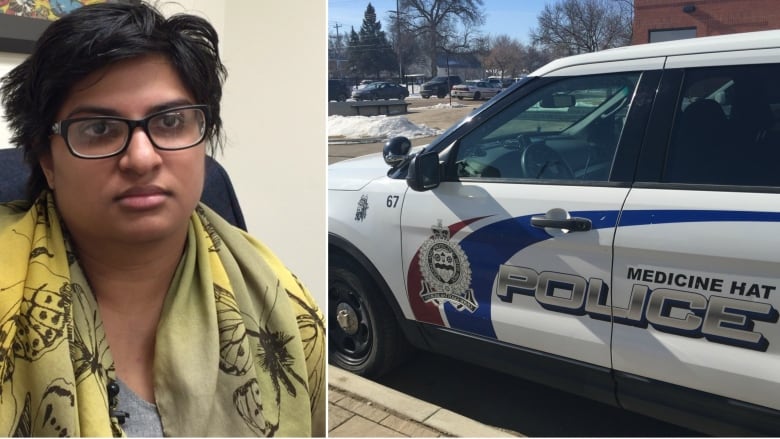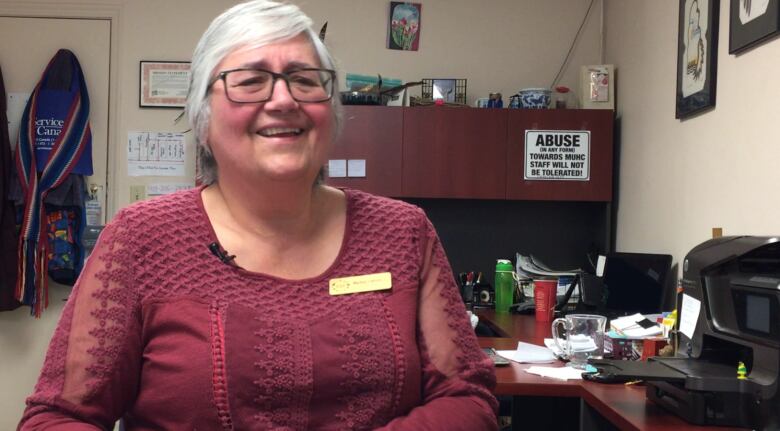Critics concerned by findings in review of Medicine Hat Police 'street check' practices
In 2011, Medicine Hat's black population was 0.5% of the city but they made up 5% of street checks

Medicine Hat's chief of police says an internal review supports his service's practice of street checks but critics say the data shows Indigenous and black people are disproportionately carded.
ChiefAndyMcGrogansays the service is initiating some changes following an internal review but saidthe report dispels any notions of racism, which had been raised as concerns in other Alberta citiesover the past year.
- Top cop says 'random' police checks not happening in Calgary, after accusations pile up elsewhere
- Edmonton police defend street checks, reject allegations of racial profiling
"It verified what we already knew.... I think over 80 per cent of the folks we didstreet checks on wereCaucasian," McGrogan said.
"It was a reflection of ourcommunity's demographics, actually, so we thought we were basically OK there."
'I don't actually think it makes any sense'
But criticslike Lethbridgelawyer Miranda Hladydisagree, saying the numbers provided by the service in the review's report speak for themselves.
Thereport states that the same year (2011)when more than 80 per cent of the street checks were of Caucasians, the Indigenous and black communitiesmade up a combined total of 4.5 per cent of the population.
According to the Medicine Hat police numbers, these groups represented 11 per cent of street checks.
That's what troubles Hlady, who obtained the report through a freedom of information request.

"The report, interestingly enough, doesn't actually talk about black people being over-carded. It does conclude somehow that Indigenous people aren't being over-carded, and I don't actually think it makes any sense given the information they gave us," she said.
- MORE CRIME NEWS | Calgary police seek driver after man shot while sleeping in his bed
- MORE CRIME NEWS |Calgary motel employee accused of sexually assaulting guest by posing as chat friend
"Their own numbers show Indigenous people being carded more often than they should be carded, and the number for black people are even more outrageous."
Hlady said that with such a high percentage of the checks being those two populations, it also raises the question if the same individuals are being stopped repeatedly.
"We wouldn't expect a difference like 0.5 per cent of your population being black and five per cent of your carded people being black, because that's a huge difference," she said.
'Trust will help with reconciliation within this community'
Marlene Cadotte of Medicine Hat's Miywasin Friendship Centre says many of her Indigenousclients have complained of being carded.
"I had a young native man who came in right off the street after it happened to him. He was walking down the street, downtown here. All of a sudden the police stopped him and asked him his name and for his ID," she said.
"They didn't say because of, or you look suspicious of they just wanted to know who he was because they didn't recognize him."

Cadotte said the man compliedbut was frustrated to be stopped in the middle of the day for no apparent reason.
"He was taken aback by it because it had never happened before," she said. "He asked why they would be doing this."
- Calgary police 'carding' practice to be modernized, made more accountable
- Police carding a useful tool for Calgary police, says chief
Cadottesaid she believes these interactions are harming the relationship between the city'sIndigenous population and the police.
"If we can lessen that or even stop that, I think that trust will help with reconciliation within this community," she said.
'They are used, they are effective'
According to Hlady,the purpose of carding hasn't been made clear by Medicine Hat Police.
"There is nothing in this report that really shows what the purpose of carding is and if it's actually achieving that purpose, and how police would, in fact, determine whatever purpose they intended for it," she said.
ButMcGrogan insists street checks are an important and integral part of policing.
"We're basically asked by our citizens to police our city and keep it safe, and we've always contended that street checks are an important part of that, and it's an important tool for basically solving crime and potentially preventing crime," he said.

When asked to provide data or examples to demonstrate street check effectiveness, McGrogancouldn't.
"We do use the information, but it's not like we say, 'Well, that helped us get a search warrant on this.' We haven't kept that [data] and we really don't know how to gather that other than hoping someone remembers and puts it into a drum of information," he said.
"They are used, they are effective, but to give you actual stats on their effectiveness, I really can't, other than to say we do use them."
Hlady said another red flag raised in the report for her was that the number of people who refused to comply with street checks was zero.
"It's not only zero one year, it's zero in 2011, 2012, 2013, 2014 and to us that suggests people do not feel they can decline to participate in the carding process, and it's probably because the police are not telling them they can decline," she said.
McGrogan said he doesn't think officers should begin their street check interactions with citizens by informing citizensit's not compulsory.
"If every time I went out in the street in uniform and the first thing I said to a citizen is, 'you don't have to talk to me if you don't want to,' I mean, what kind of dialogue and how is that for engaging our community,' he said. "I don't think that's what most Albertans would want."
New street check policyready for approval
The review has prompted the Medicine Hat Police Service to initiate more bias training with their officers as well as create a written policy for street checks, among other small changes.
"There is a policy, basically a standard operating procedure for street checks that has been developed and is ready for our review and then dissemination," said McGrogan, adding that the policy recommends a seven-year retention of street check information.
Hladyis collecting data from all seven independent police stations across the province. She said it's important people understand that carding isn't a big city problem.
"It's something that has an impact on marginalized people living in these communities. It's also important people understand that we also don't want to see white people being carded either," she said. "We would like the carding to stop for everyone."
- MORE ALBERTA NEWS |'It's not impossible': Western Canada's risk of water shortages rising
- MORE ALBERTA NEWS | Bragg Creek teen accused of attacking grandmother with sword ordered to see psychiatrist












_(720p).jpg)


 OFFICIAL HD MUSIC VIDEO.jpg)
.jpg)



























































































